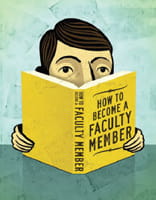Find out what it takes to land the position and thrive in it from Walden alumni.

Professors refer to it as the “aha” moment: when a student suddenly understands a difficult assignment or successfully completes a challenging project. “You watch students grow throughout a course and by the end they’re beaming,” says Dr. Gayle Walter ’10, a Master of Public Health (MPH) and PhD in Public Health alumna, who is a faculty member at the University of Dubuque and an online faculty member at Grand Canyon University. “You provide them with the tools to achieve, they put in the effort, and it’s amazing to know you’ve made a difference by contributing to their success.”
If you want that same “aha” experience, consider this both an introduction to acquiring a position and to growing and thriving in higher education. These tips from Walden alumni who currently teach at a variety of institutions—online and on the ground—will help you navigate the path to a teaching career and flourish once you’ve landed.
Prepare & Collaborate
Finding the ideal teaching position is a process that integrates “planning, publishing, presenting, promoting, and persistence,” says Dr. Leo Parvis ’98, a PhD in Health Services alumnus and a principal instructor at Dunwoody College of Technology. “You’ll find all of those Ps are interrelated as you educate yourself, network, and contribute to your field.” Where do you start? Consider this advice:
- Plan your long-term career goals. Would you rather teach online or on campus? Do you prefer to teach young adults or adult learners? Are you committed to teaching within your community or do you want to teach students around the world? “Be sure you’re on a path to reach your goals by knowing what you want,” advises Dr. LaRon A. Scott ’11, a Doctor of Education (EdD) alumnus, who is an assistant professor at Virginia Commonwealth University and an online adjunct professor at Ashford University.
- Prepare your academic portfolio. Begin with your curriculum vitae (CV). While a résumé includes basic facts about your qualifications, it is typically too brief for faculty positions. A CV will allow you to load details about your education, teaching and research experience, publications, presentations, awards, honors, and affiliations. Don’t be afraid to take this one step further: “Compose a statement to explain your teaching philosophy that you can tailor to each position,” says Christy Fraenza ’10, an MS in Psychology alumna and PhD in Psychology student, who is an adjunct faculty member at Pennsylvania Highlands Community College. These extra details may help you win an interview.
- Search for teaching positions while working on your Ph.D. “Many two-year and community colleges will allow you to teach without a Ph.D. if you’re enrolled in a doctoral program,” says Dr. Shireese Perez ’11, a PhD in Management alumna and an adjunct professor at Northwestern College and Kaplan University. In other words, start building your academic résumé as soon as you can.
- Create partnerships. “Networking leads to partnerships, and partnerships are a route to almost anything you want to accomplish,” Scott says. Support a faculty member’s research as a collaborator or make time to be a guest lecturer. He adds, “Never say no to an opportunity. Keep yourself on other professors’ radar as a valuable and available resource.”
- Volunteer to teach. “Teach pro bono at organizations you care about,” Perez suggests. “I gained valuable classroom experience by creating curricula and teaching adult-education courses, which were also excellent additions to my CV.”
- Research universities and schedule an informational interview. Go online, talk to your colleagues and co-workers, and reach out to your professional community to connect with colleagues in higher education. “After I was assured a school was reputable and accredited, and the teaching philosophy aligned with my own, I scheduled an appointment to talk with the program chair on the phone about teaching opportunities,” Walter explains.
- Aim to teach what you know. “When I began looking for teaching positions, I wasn’t apprehensive about online tools like Moodle or eCollege,” Walter explains. “Being a student of online learning prepared me to teach online, which requires discipline and commitment.”
- Build your scholarly portfolio. Publish your research and present papers at conferences to further the reach of your academic network. “Research is an important part of any field. You should never stop learning about your areas of interest,” says Dr. Christine Feeley ’09, a PhD in Psychology graduate and an adjunct faculty member at Adelphi University, Dowling College, Farmingdale State College, and Suffolk County Community College. Many colleges look for faculty members who conduct research programs that allow students to get involved, she adds. Above all else, maintain your research and publish your findings.
- Don’t give up. “Be persistent,” says Feeley. “It is difficult to obtain a teaching position. If you have the drive and passion to educate others in your field, it is vital to remain determined.”

Thrive in Your Role
Once you’ve secured a teaching position, a list of best practices can help you excel. Spending hours writing curricula, preparing lectures, and compiling presentations are only part of faculty members’ responsibilities. Add these exercises to your daily and weekly to-do lists:
- Keep your teaching techniques fresh. Fraenza suggests that new instructors sit in on courses to observe other faculty members. Alternately, ask colleagues to sit in on your classes, so they can provide feedback. Periodically ask your students what’s working for them and what isn’t; don’t wait for end-of-the-semester evaluations.
- Listen to your students. “I left my business, so I could teach,” emphasizes Dr. David C. Jones ’11, a PhD in Management alumnus and an assistant professor at Southern Wesleyan University. “When I teach, my students are my clients. I want to know their expectations and how I can help them achieve their goals. What projects can I design to enhance their skills and prepare them for work in the real world?”
- Make yourself accessible. “Most students have extremely busy lives and lots of commitments—which includes a commitment to learning,” Walter explains. Check your email throughout the day and respond promptly to your students’ inquiries.
- Remain a lifelong learner. “Enroll in continuing education courses to learn how to create learning environments that will stimulate your students,” Perez advises. Walter also suggests joining national organizations in your field or discipline. “These memberships provide opportunities to keep your learning and teaching techniques fresh,” she says.
- Share your professional experiences. “When my adult learners ask me, ‘What have you done?’ or ‘Why are you in a position to teach me?’ I can point to my professional and academic experience,” says Perez, who began her professional life as a corporate trainer and business consultant. “That’s the key to my success.”
- Continue to research and share your work. Network with colleagues and alumni who share your research interests; collaborate with them on papers and presentations. “Read and share your research with your students,” adds Walter. “Serve on academic committees and bring information back to your students and fellow faculty.” Ultimately, your contributions could inspire you to create courses to share information with your students, motivate you to publish something new, or even open the door to new opportunities for freelance or part-time work within another industry.
- Enjoy what you’re doing. Always show your students that you love to teach and care about their learning. “You need to fulfill your program’s curriculum and goals,” says Perez. “But you also need to understand who the students are and be attuned to the types of students you’re teaching.” Moreover, adds Parvis, “Have passion for teaching and the discipline in which you teach.”
Visit Career Insider to find the tools and strategies you need to initiate a career change or transition. Go to www.myWaldenAlumni.com/careerinsider today.
Meaningful Moments in Teaching
Our alumni have a lot to say about their goals and successes as faculty members. Read on to learn how they make their positions exceptionally meaningful:
Create an accolades file. “I have a feel-good file. It includes end-of-course surveys, thank-you emails from students, and other confirmations that I’ve made a difference while teaching,” says Dr. Gayle Walter. “Those notes reinforce that I’m doing the right thing.”
Tailor your content. “One of my primary objects in teaching is helping students set and meet their goals,” says Dr. David C. Jones. For example, he recently tailored a marketing project for a student who wanted to go into politics by asking him to develop a campaign plan and initiate a grassroots movement. Although his student lost that race, he ran again two years later. “Today he’s the youngest South Carolina rep the state has ever had. He took that project and literally ran with it,” Jones says.
Inspire others. Presenting at conferences can positively influence your career, but it can also inspire others. “I love going to national conferences and giving presentations on the changes I’m making through my research and instruction,” says Dr. LaRon A. Scott. “At one conference, a man came up to me and said he’d read an article I had published, which inspired him to attend my presentation. To know someone was reading and appreciating the work I’m doing was a real joy.”
Celebrate milestones. Dr. Christine Feeley was named 2011 Adjunct Professor of the Year in Psychology at Adelphi University in Garden City, N.Y. “I was completely blown away when I received this award, but at the same time so honored,” she says. “It was a tremendous feeling to know that my colleagues and students recognized my hard work and determination. It is always a nice feeling knowing you are valued by those you work with directly.” — C.L.
Meet the Faculty
Walden alumni are faculty members at a range of universities and colleges—and many more contribute their knowledge as visiting professors. These alumni contributed their voices to this feature:
Christy Fraenza ’10, an MS in Psychology alumna and PhD in Psychology student and an adjunct faculty member at Pennsylvania Highlands Community College
Dr. David C. Jones ’11, a PhD in Management alumnus and an assistant professor at Southern Wesleyan University
Dr. Shireese Perez ’11, a PhD in Management alumna, an adjunct professor at Northwestern College and Kaplan University, and a Walden Ambassador
Dr. LaRon A. Scott ’11, a Doctor of Education (EdD) alumnus, an assistant professor at Virginia Commonwealth University, and an online adjunct professor at Ashford University
Dr. Gayle Walter ’10, a Master of Public Health (MPH) and PhD in Public Health alumna, a faculty member at University of Dubuque, and an online faculty member at Grand Canyon University



